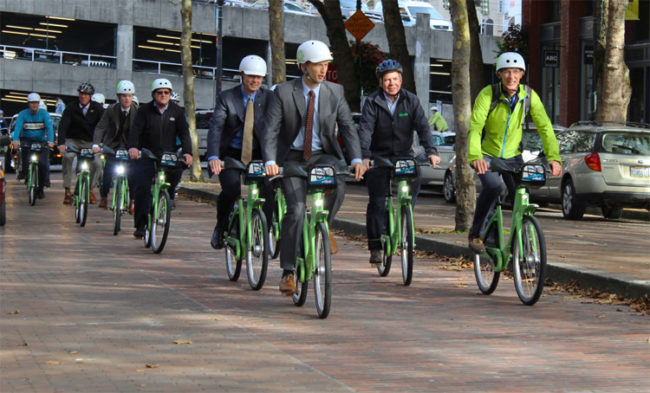Bike-share in Seattle should be doing great. The city has a decent bike lane network for an American city, and cycling is on the rise. Transit options are also plentiful, and bike-share should fit right in as a complement to buses and trains.
But bike-share has floundered in Seattle, and the City Council is weighing a $5 million infusion. Back when the system, known as Pronto, launched in 2014, we wondered if the city's mandatory helmet law would hinder its success. In light of its current struggles, Tom Fucoloro at Seattle Bike Blog raises the same question:
Though I understand that it may seem counter-intuitive at first, best practices from the the safest cycling cities in the world do not include helmet laws. In fact, nearly all major cities in the U.S. and across the globe have declined to regulate bicycling headwear for adults.
But surely with good intentions, King County’s Board of Health decided in the 90s to require helmets for people of all ages, and that rule started applying to Seattle after a 2003 City Council vote to adopt the county’s regulation. 13 years later, that decision is very likely hampering the city’s ability to get the most from its bike share efforts.
How big an impact is the helmet law having? That’s nearly impossible to say for sure, but bike share experts are pretty much in agreement that it’s an impediment.
“[A helmet law] will kill your system regardless,” Baltimore’s bike share leader Scott Tillman told the Seattle Times’ David Gutman recently. “You can still encourage it, but when you pass a law like that you have a lot more challenges. Once you make it a law, you just kill it.”
But Andrew Glass Hastings, SDOT’s Director of Transit and Mobility, does not think the helmet law is a leading factor holding back bike share here.
Fucoloro says that politician don't want to be seen as "anti-safety" by repealing the helmet law -- even though doing so would likely lead people to bike more, setting off the positive feedback loop of safety-in-numbers.
Here's what we're also reading this morning: TransitCenter explains how transit agencies can use low-cost, quick-start "tactical transit" projects to deliver service improvements to riders. And Green City Blue Lake reports on Cleveland's impressive plan to convert excess roadway space into a network for bike lanes.






